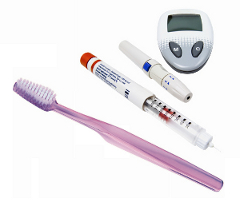 You may already be aware of the major risks associated with diabetes including genetics, obesity, and high blood pressure. However, you may not be aware that periodontal health is also associated with diabetes. Periodontal disease is a chronic inflammatory disease that affects the gums and bone supporting the teeth. Periodontal disease has been associated with the progression of other diseases such as cardiovascular disease and diabetes. The truth is that the relationship between diabetes and periodontal disease work like a two-way street. Having diabetes can increase your risk of developing periodontal disease. So that means that managing periodontal disease can help people with diabetes better control their blood sugar levels. According to the National Diabetes Education Program, as of 2010 there are 25.8 million Americans with diabetes — 8.3 percent of the U.S. population. Of these, 7 million do not know they have diabetes. Having this knowledge lets us know just how important it is to maintain healthy teeth and gums.
You may already be aware of the major risks associated with diabetes including genetics, obesity, and high blood pressure. However, you may not be aware that periodontal health is also associated with diabetes. Periodontal disease is a chronic inflammatory disease that affects the gums and bone supporting the teeth. Periodontal disease has been associated with the progression of other diseases such as cardiovascular disease and diabetes. The truth is that the relationship between diabetes and periodontal disease work like a two-way street. Having diabetes can increase your risk of developing periodontal disease. So that means that managing periodontal disease can help people with diabetes better control their blood sugar levels. According to the National Diabetes Education Program, as of 2010 there are 25.8 million Americans with diabetes — 8.3 percent of the U.S. population. Of these, 7 million do not know they have diabetes. Having this knowledge lets us know just how important it is to maintain healthy teeth and gums.
Researchers have discovered that people with diabetes may be up to four times more likely to develop periodontal disease. Periodontal disease is often considered to be a common complication of diabetes, along with heart disease and vision problems. One of the reasons periodontal disease may be more prevalent could be because people living with diabetes are more susceptible to contracting infections. Therefore diabetics are more likely to react to the infection caused by bacterial plaque between the teeth and beneath the gums. Those who don’t have their diabetes under control expose themselves to a much higher risk: they are even more likely to develop periodontal disease than people who better manage their diabetes and keep their blood sugar levels under control.
Research has shown that periodontal disease may make it even more difficult for people who have diabetes to control their blood sugar levels. Periodontal disease is often characterized by inflammation in the mouth, particularly the gums which are supporting structures for the teeth. This inflammatory reaction can affect how diabetic patients process insulin, and contribute to increased periods of time when the body functions at sugar levels which can be dangerously high. Prolonged exposure to high blood sugar levels can greatly increase the risk for diabetic complications. Therefore, it is very important for people with diabetes to maintain healthy teeth and gums through routine tooth brushing and flossing, and of course regular visits to a dental professional such as a periodontist. If you have been diagnosed with, or are at risk for periodontal disease, you should seek treatment from a periodontist, a dentist with specialized training in the diagnosis, treatment, and prevention of periodontal disease.
If you or someone you know has diabetes, you are already well aware of how crucial it is to monitor the status of the disease on a daily basis. However, maintaining good oral health can significantly contribute to better controlling diabetes. To keep your oral health at it’s best it’s important to brush after every meal and to floss at least once a day to remove the bacterial plaque between teeth which can also end up beneath your gums. Finally, don’t forget to see your dental professional at least twice each year for professional dental cleanings.
The source of this data is the perio.org AAP November 2009 Patient Page titled “My toothbrush can help my diabetes? Diabetes and Periodontal Disease”. To find the original article and for more information please visit: www.perio.org
For more information about diabetes please visit The National Diabetes Education Program at ndep.nih.gov/

Thank you for keeping up to date with this health information. I work with many diabetics, both type 1 and type 2. Most don’t understand the importance of good oral hygiene as related to their overall health, and take regular dental check-ups for granted. Being able to have their dentist inform them of the relationship between diabetes and periodontal disease is very useful. This is something I can also definitely pass along to my friends as well, very useful!